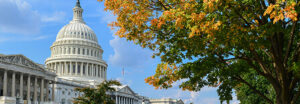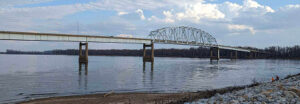As the Trump Administration reviews federal grant priorities and timelines, we encourage those working on project proposals to reach out to federal and state program leads and monitor official federal channels for the latest guidance. AFC is tracking key flooding and resilience programs and will provide specific updates whenever possible.
NFWF’s NCRF helps coastal and Great Lakes communities plan, study the feasibility of, design, permit, engage stakeholders about, and implement large-scale resilience projects to reduce regional threats due to flooding, sea level rise, storm surge, subsidence, and erosion.
| Supports nature-based solutions | Has a regional or watershed focus | ||
| Does not require matching funds |
Application cycle: Pre-proposal application cycle: May 6, 2025; application by invitation and due July 17, 2025.
Summary: The National Fish and Wildlife Foundation’s National Coastal Resilience Fund is a good fit for coastal communities and areas with critical infrastructure vulnerable to flooding, including hospitals and emergency routes. Funds are awarded to projects that restore and strengthen green infrastructure systems to protect coastal communities from the impacts of storms, floods, and other natural hazards and enable them to recover quickly, while also enhancing habitats for important fish and wildlife populations. Funds are also available for community capacity building and planning, which coastal communities in the early phases of identifying their resilience needs can use for community outreach and determining which adaptation projects should be considered and prioritized.
Eligible applicants: Local governments, state and territorial government agencies, Tribal governments and organizations, non-profit 501(c) organizations, educational institutions, or commercial (for-profit) organizations. Projects must be located within the coastal areas of U.S. coastal states, including the Great Lakes states, and U.S. territories and tribal lands.
Eligible activities: Applicants can apply for one of the following categories that best reflects their project’s purpose and activities. NFWF prioritizes proposals that advance previously funded NCRF projects to the next category, as part of its efforts to build a strong pipeline of coastal resilience projects from early planning through implementation.
- Community capacity building and planning: Hiring and training staff, engaging the community, and collecting environmental or economic data to plan projects that prioritize flood risk reduction strategies.
- Site assessment and preliminary design: Evaluate potential project sites and alternatives, engage stakeholders, collect baseline data, assess risk reduction benefits, conduct cost-benefit analyses, consult permitting agencies, and develop preliminary designs.
- Final design and permitting: Advance projects from concept to final engineering plans, including detailed cost estimates, expanded stakeholder engagement, and permitting coordination to prepare for implementation. May also include limited site assessment and baseline monitoring.
- Restoration implementation: Construct restoration or nature-based projects with measurable flood risk reduction and conservation outcomes. All projects must include at least one year of post-construction monitoring.
Funding: Generally, no federal statutory maximums exist for eligible activities. On average, funding is available in the amounts of:
- $100,000 to $1 million for community capacity building and planning, site assessment and preliminary design, and final design and permitting projects.
- $1 million to $10 million for project restoration and monitoring.
- The Department of Defense may contribute additional funding for coastal resilience projects in areas surrounding and benefitting military installations.
Cost share: A non-federal match is not required, but is strongly encouraged to show broad support for the project. Match ratio will still be considered as a review criterion during evaluation of proposals.
Application process: Learn more in the NCRF Request for Proposals; this page also includes email addresses if you have questions about the application or project ideas.


